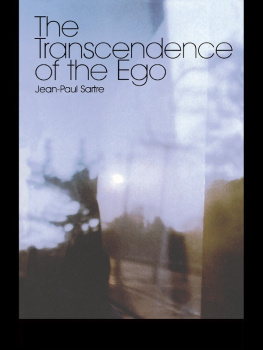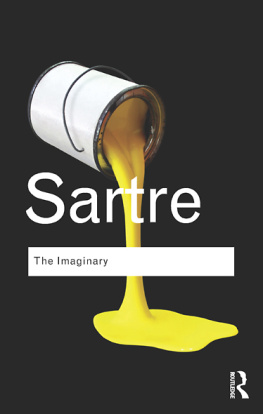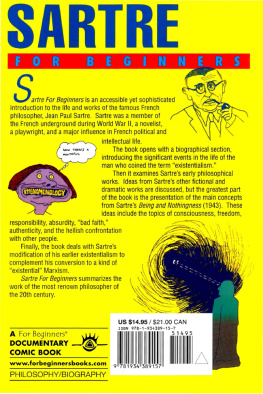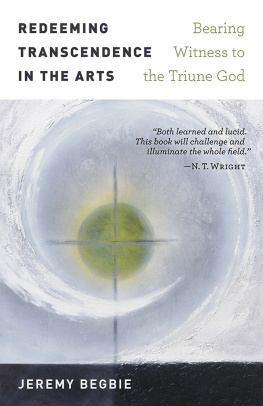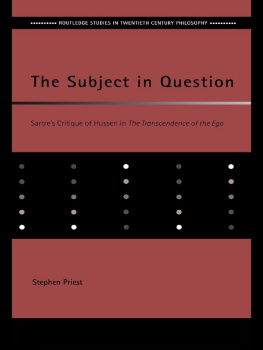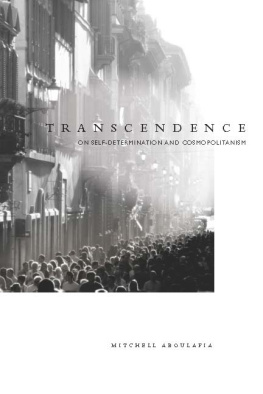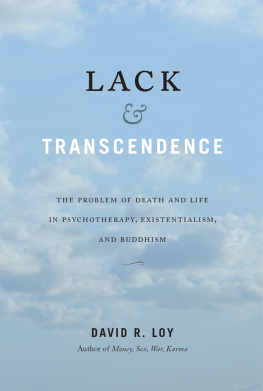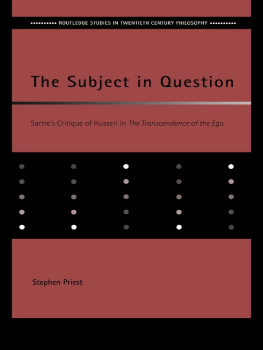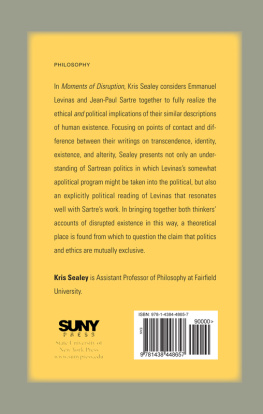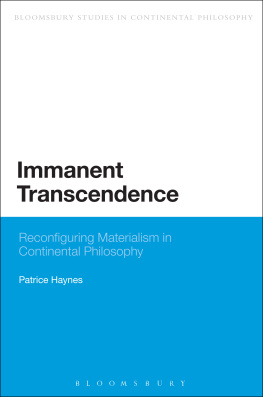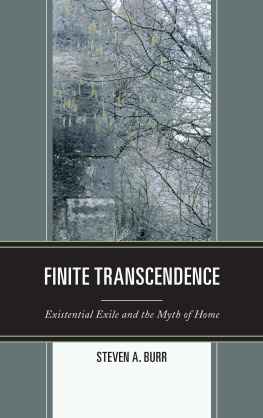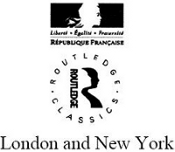This fresh translation makes this classic work available again to students of Sartre, phenomenology, existentialism, and twentieth century philosophy. It includes a thorough and illuminating introduction by Sarah Richmond, placing Sartres essay in its philosophical and historical context.
La transcendence de IEgo
Libraire Philosophique J.Vrin, Paris, 1988
First published 2004
by Routledge
2 Park Square, Milton Park, Abingdon, Oxfordshire OX14 4RN
Routledge is an imprint of the Taylor & Francis Group
This edition published in the Taylor & Francis e-Library, 2005.
To purchase your own copy of this or any of Taylor & Francis or Routledges collection of
thousands of eBooks please go to www.eBookstore.tandf.co.uk.
Translation Routledge 2004
Introduction Sarah Richmond 2004
This book is supported by the French Ministry for Foreign Affairs, as part of the Burgess programme headed for the French Embassy in London by the Institut Franais du Royanne-Uni.
All rights reserved. No part of this book may be reprinted or reproduced or utilized in any form or by any electronic, mechanical, or other means, now known or hereafter invented, including photocopying and recording, or in any information storage or retrieval system, without permission in writing from the publishers.
British Library Cataloguing in Publication Data
A catalogue record for this book is available from the British Library
ISBN 0-203-69436-8 ;Master e-book ISBN
ISBN 0-203-34518-5 ;(Adobe eReader Format)
ISBN 0-415-32068-2 hbk
ISBN 0-415-32069-0 pbk
INTRODUCTION
Sarah Richmond
Jean-Paul Sartres The Transcendence of the Ego (hereafter TE) first appeared as an article in the French academic journal, Recherches Philosophiques in 1937. It was among Sartres first philosophical publications, the outcome of a period of intense critical engagement with the phenomenological philosophy of Edmund Husserl (18591938). Sartre had become interested in phenomenology earlier in the 1930s and devoted much of the year (1933/4) that he spent as a scholar in the French Institute in Berlin to a close study of Husserls writings. At the time, the publication of TE was an event of minor significance, making available to an academic franco-phone readership a brief contribution by a young school-teacher to a debate which (although its topicthe selfwas of central philosophical importance) was conducted here within the esoteric idiom of phenomenology.
From todays standpoint, the historical importance of TE massively compounds its inherent philosophical interest, and this excellent new translation by Andrew Brown provides a welcome opportunity to re-examine it. TE demonstrates the presence in Sartres thinking from its earliest stage of ideas which, although not yet consciously entertained as such, were to become central tenets within his existentialist philosophy. Sartres hostility to a conception of the self as an inner entity at the core of individual human beings, playing an explanatory role in relation to their experience, is clearly conveyed in TE, along with his rejection of any psychology that trades on such a conception. Sartres own conception of consciousness as absolute, insubstantial, and transparent is also voiced here, and his negative attitude towards Freudian psychoanalysis, based on its denial of these features, is briefly expressed.
TE also provides the first instance in print of Sartres attempt to define his relationship with one of his most important early interlocutors, Husserl. Recollecting, a few years later, the period in the early 1930s when he immersed himself in Husserls phenomenological writings, Sartre wrote in his War Diaries that before he could move on to study Martin Heideggers philosophy, he had first to exhaust Husserls thinking. For me, moreover, to exhaust a philosophy is to reflect within its perspectives, and create my own private ideas at its expense, until I plunge into a blind alley (Sartre 1984, pp. 1834). TE provides an excellent example of the parasitic creativity to which Sartre refers. And despite its moments of undeniable brilliance, one can glimpse, now and again, at least the threat of a blind alley.
The opening pages of TE do not focus in the first instance on Husserl. The problem of the self with which Sartre is concerned belongs to philosophy quite generally, and Sartres bold initial declaration of intent is stated in general terms: I should like to show here that the Ego is neither formally nor materially in consciousness: it is outside, in the world; it is a being in the world, like the Ego of another (p. 1 in this volume; hereafter simple page nos. in parentheses will refer to pages in this volume).
Sartre suggests that the view he is contesting is widely held: he attributes it, in this first paragraph, not only to most philosophers, but also to psychologists. Nonetheless, and notwithstanding Sartres use of Kants Critique of Pure Reason as a way in to his problem, it soon becomes clear that his main opponent is Husserl.
This is indicated, too, by the title of Sartres essay. Sartres use of the term transcendence follows Husserls, and refers to an opposition central to Husserls thought. In Husserls usage, an object of consciousness is immanent if all its parts are contained within a single conscious experience. A sensation, for example, is inherent within consciousness: it is presented in its entirety, lived through, as Husserl puts it. A transcendent object, on the other hand, has aspects some of which always exceedtranscenda particular experience of it. Material objects are transcendent in this sense: visual perception, for example, cannot present a material object all at once, but only perspectivally. Looked at from the front, the back of the object remains unseen.

